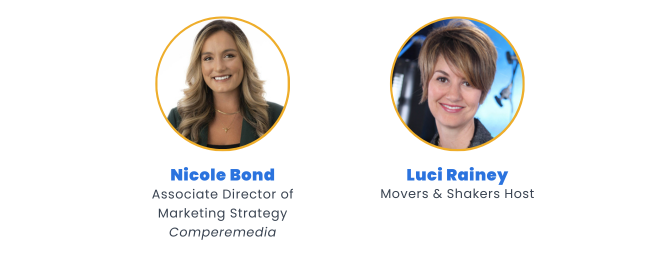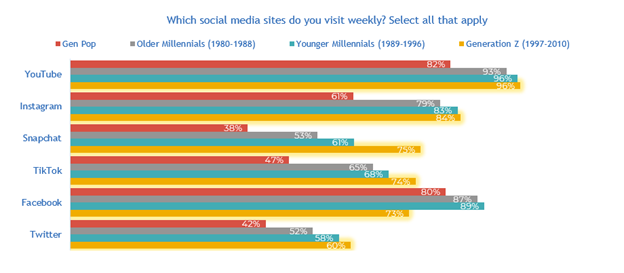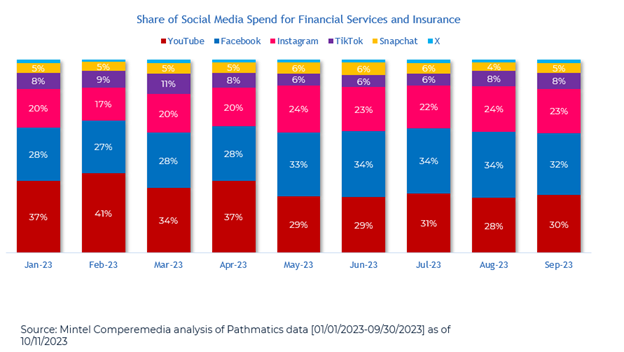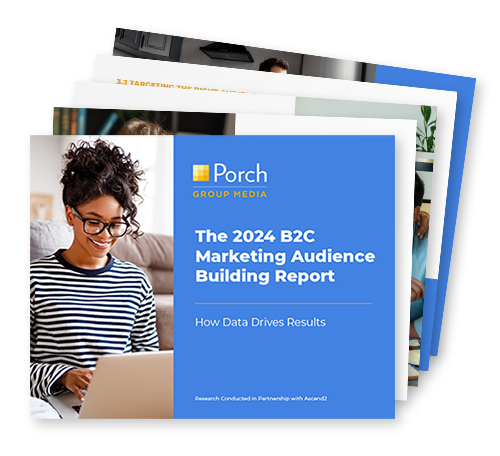Marketing to Gen Z: Appeal to Partnership

Gen Z’s buying power is growing, and soon this generation will become the largest audience of shoppers and purchasers. Being the first generation of true digital natives, they consume advertising and media in a completely different way than other consumers.
In this podcast hosted by Luci Rainey, former marketing executive for Comcast and PODS, special guest Nicole Bond, Associate Director of Marketing Strategy at Comperemedia, will share her expertise on Gen Z trends and how to best engage with this key audience in 2024.

This transcript has been adapted from a podcast
Luci:
In today’s fast-paced landscape, the speed at which trends are changing is actually mind-boggling.
Adding complexity to a marketer’s daily worries is the ever-evolving mindset of the Gen Z consumer. Today we’re going to focus on the 18 to 25-year-old segments within the Gen Z segment.
Engaging with them, with what is becoming actually the largest consumer segment, is really quickly becoming a paramount challenge for many marketers. These are very different consumers. They have unique preferences, unique values, and unique behaviors. Gen Z really represents a dynamic market that demands a fresh approach. They really are different consumers than we’ve seen before.
I’m thrilled to have Nicole Bond here with us today as our resident expert on Gen Z. Nicole is an Associate Director of Marketing Strategy at Comperemedia Media, and we are lucky to have her walk us through the nuances of this segment. We’ll dive into some actionable strategies and insightful tricks to help you connect with marketing to them. Welcome, Nicole.
Nicole:
Thanks so much, Luci for having me. My name is Nicole Bond, I’m the Associate Director of Marketing Strategy at Comperemedia.
Mintel is a global market intelligence agency that specializes in understanding what consumers want.
I’m really just giving that holistic view to companies to understand not only what their consumers are asking for, but really diving into what their competitors are doing to meet those needs.
My day-to-day is allocated to focusing on audience strategies and channel strategies, and I’m really happy to be talking about this very popular cohort.
Luci:
You have something in common with Porch Group Media which also focuses on developing audiences, either through zero, first, second, or third-party data.
There are a lot of expected and unexpected trends with Gen Z.
One of the biggest unexpected trends that jumped out at me was that half of Gen Z says recommendations from influencers are one of the most important factors in their purchase decisions.
Gen Z tends to trust their peers who really have become experts in certain areas. Think makeup techniques, travel, or other similar things different types of things. Nicole, tell us about that and why that’s different.
Nicole:
I think one of the biggest differences is how Gen Z is influenced by social media. When we think about millennials, they were really into, and still are into macro mega influencers. So think of your A-list celebrities with star power. That is where they were getting recommendations and where they were following trends.
With Gen Z, those mega influencers no longer feel relatable. They seem out of touch and not necessarily connected to Gen Z’s everyday reality.
So this generation is turning to influencers that are more nano and scaled. These influencers are more specialized in a very specific product, a very specific industry in a very specific niche, and by doing that, they are gaining this mass following, but they feel more relatable. That relationship feels more authentic. And that’s something that we’ll get into a lot throughout this conversation today, is that it’s not necessarily about pushing these products on Gen Z. That’s not what they want.
It’s more about making sure that they can see how that product or service actually benefits their day-to-day life, and they are trusting that word-of-mouth influence from people that they can relate to. So, it is a much smaller scale. Of course, there are still some big mega influencers that Gen Z does follow. But when it comes to that influence, it’s coming more from those nano influencers that have specific online communities.
I can think of a great example. My friend’s daughter is an influencer called Curly Temple. And she really teaches people how to leverage their curly hair. You know, back in the day, curly hair was annoying. I don’t want to deal with it, I went to straighten it. I’m doing the Japanese straightening. I’m trying to just get away from my curly hair. He name is Karen and I think she has about 18,000 followers. She teaches people how to use curly hair products so they can manage their curly hair.
My daughter has curly hair and she thinks this is great, and she’s always looking for different products to try to manage her hair. Karen has this amazing following and sponsorship from different products. She’s actually a brand director – this isn’t her full-time job, she does it on this side but she’s got a following just on curly hair. This is something that’s very niche, right? I mean, it’s amazing.
Luci:
Another stat is that over 70% of Gen Zers influence their family purchasing decisions on food and household products. They have around 360 billion of disposable income. That’s their own disposable income, where they’re getting in their car and buying something themselves or buying it online, but 70% influence now what their parents are buying. I mean, that is astounding.
Nicole:
Oh, absolutely. I think that goes back to the idea that Gen Z are truly individual in how they think, and the things that they demand from the world around them, and that includes how they purchase and how they interact with their families. So, they do have such a strong influence not only on food or household products but just in general such as on what that family is going to do. They have a wealth of information at their fingertips. They have a pretty good understanding of the things that are good, things that are bad, the things that are up and coming.
They also have a pulse on breaking news, where it’s relevant to them, and they use that to really guide not only their decisions but how they are influencing their family, and the things that they’re able to say. We should choose this over this, and here’s why.
That may not always be rooted in data and may be rooted in opinions or what their friends are doing. But they absolutely are comfortable sharing their thoughts, sharing their opinions in doing so in a way that is impactful to the world around them.
Luci:
There are myths and realities out there about Gen Z and we’re going to really hone in on trends and focus on marketing to Gen Z.
Nicole, you do a great job breaking it down into four key areas of why they’re different. Again, they’re 18% of the population and are now our largest consumer segment. So, why are they so different?
Nicole:
I think that first and foremost, they are social media minded and they are digital first. They always have been. They’ve grown up in a world where they’ve never known anything different than being connected all the time, everywhere, all at once. So, when it comes to how they build communities, how they get product recommendations, how they discover new things – all of that is really happening in the palm of their hand.
So they are really connected online, and what we start to see is those online identities, those online connection points really are fueling who they are in the world around them.
Something that is so important about this group, not only are they becoming a massive segment of the US population with substantial buying power, but they’re really diverse, right?
They are the most diverse of any generation that we’ve seen in the past, in terms of race, gender, and sexuality, they value that individuality. They’re not shying away from what makes them different, instead, they’re really leaning into that, will also proudly supporting equality, equity, and inclusion. Doing it in a way where everybody’s individual identity is valued and is seen as something that should be recognized. It should be respected, and they’re really rallying behind those who are authentic and accurate representations in all aspects of their lives.
So, not only are they finding who they are on social media, but they’re really leaning into what makes them unique. We can see that they’re driven for change – they have experienced several economic and social traumas, right? The world around them has not always been kind. And they’re not really willing to sit back and be silent and just kind of go with the flow.
When we think about how they have interacted with these events, whether it’s in social conversations, whether it’s within their family dynamics, they are really calling for social and environmental change. And what we’re seeing more than ever with Gen Z is that they are holding corporations accountable for their actions.
We really see consumers, specifically Gen Z consumers, wanting brands to take a change. They believe in the power that brands have. So, whether it’s speaking up against an anti-LGBTQ legislation, whether it’s standing tall on the basis of consumer backlash, we’re really seeing Gen Z consumers driving a charge to say, Don’t just talk the talk, but, walk the walk. Be about what you’re putting out, what your marketing, and what you’re trying to essentially profit from. We’re really seeing them driven for that change. And that comes from a really strong pull for equal representation, for equal value across different identities.
And with all of that, while they are so driven, while they are independent in their thinking, we do see them seeking real-world guidance. So they really want help, they want guidance navigating the real world specifically as they enter adulthood. But they want to be met with an empathetic tone, and they need help navigating their priorities. So when we get into how we communicate with them, we’ll see that it’s so important to educate in a way that doesn’t feel like you are talking at them, but you’re talking to them.
You’re understanding, and you’re respecting the things that make them unique, but also you’re helping them navigate this next stage of adulthood, which is quite complex, even more complex now than ever before.
As brands and as marketers, when we think about how we connect with Gen Z, it really leans into that. “Let us help you along. Let us show you how to navigate the world around you and do it in a way that is truly a value add.”
Luci:
When we look at Gen Z, they’re moving through life at different paces. So for example, they are a large population that doesn’t have kids but 30% do. There is a split between renting and owning. They are making different strides at different paces. Some are already working full-time. They have a full-time income. They have money coming in on a consistent basis.
We’re seeing that they are hitting different life stages at different times and when we think about how we connect with them, it can not be a one-size-fits-all. We can’t, as marketers, connect with them all at the same time in the same way. We really need to understand a little bit more about this audience as a whole, and also our specific audience before we dig in and launch a campaign that’s going to resonate with Gen Z.
Nicole:
80% of adult Gen Z consumers agree that financial wellness impacts our overall health. We are seeing finances really be something that Gen Z adults are paying attention to because when there is financial stress, things like anxiety and slipping into depression become even more prevalent because it is a stressor.
So when we’re thinking of how we connect with Gen Z, we have to always make sure that we’re respecting that financial boundary, that we’re educating them in a way that feels really like they’re making a decision, that they know everything on the table. And there’s nothing hidden behind a closed door.
When we’re thinking about that connection point, finances are important. Finances are a part of kind of their overall health. It does kind of play a role in their day-to-day lives.
And it’s something that we have to keep in mind specifically when we are trying to push bigger products, bigger services, and more financial-heavy commitments on Gen Z. We want to make sure that we’re setting them up to understand how they navigate that financial journey over the long term.
Another important point, almost 60% of Gen Z have used Buy Now, Pay Later. Really they’re the largest user of this payment feature.
We know they’re digital natives so they want things to be convenient in their hands. So that is why so many of them prefer using a mobile wallet. That’s why so many of them like having their phones or navigating their finances in an app because that is just the nature of how they interact. That’s how they operate within the world. It’s in the palm of their hand, and it is that digital interaction.
But when we think about that as brands and as advertisers, we’re like, “Oh, they want new things.” And while they do, they also have this trust that’s rooted in tradition that often comes from their friends and family. That word-of-mouth sentiment and a lot of their friends and families have that backing with traditional financial institutions.
So we really see them wanting the best of both worlds. They want something that’s been around that they can trust and that they can lean into. They know it’s always going to be there, but they also want the convenience aspect of it. That’s why we see so many financial services institutions right now trying to bulk up their apps. They’re trying to make it an all-in-one experience. They’re trying to appease and evolve with time.
This is showing that Gen Z is pushing digital. But there are qualities that they still care about that aren’t necessarily always about the next big flashy thing. It’s that sentiment of trust and being able to back up your claims of being someone that they can rely on and really lean on throughout their financial journey. They love a digital opportunity, but they do also love that sentiment of legacy as well.
Luci:
This I think brings us to our next point, and this is to be expected. This generation has online audio services like Spotify and Apple Music. But what’s unexpected is that they like owning physical books. So what other kind of insights, Nicole, can you offer?
Nicole:
I think it goes back to the idea that Gen Z is hyperconnected. They are constantly online. They’re constantly consuming media, and interacting with their social circles, everything that they do is online. And so they get tired. They want something that’s a little bit different. We see Gen Z specifically wanting to separate from their devices. So, where it was kind of nuance for millennials to connect online and do all these things, Gen Z wants that brief, traditional kind of nostalgic experience.
So reading, having a book in your hands, feeling a book. They like direct mail, which is such a weird thing for me to say about Gen Z, but they really do enjoy receiving direct mail. Not because of the offers, but because it’s an experience that they don’t get to have on a daily basis.
We see them really valuing offline interactions and experiences. For example, they’re big on festivals. They’re big on connecting with their friends off their devices. Really just anything that allows them to disconnect from that always-on mentality and lets them experience something that seems so traditional to older generations.
While they value offline experiences, we, as marketers can’t ignore that they are continually online. They visit social media sites weekly and daily. But what we have to pay attention to is the sites that they are on are different than what we’re used to. We want to find those opportunities to connect specifically with Gen Z. Yes, everyone’s on YouTube. We see online video being a very prominent thing when we look at Gen Z and both younger and older Millennials.
But where we start to see some big differences is on platforms like Instagram and Snapchat, which is forgotten. TikTok is booming. Gen Z is really over-spending their time and they’re more likely to visit these sites on a weekly basis. Look at the difference between TikTok and Instagram.

However, brands aren’t meeting them there. So when we look at financial services and insurance, for example, we see a huge push on Facebook. That is not a channel that is integral to how Gen Z operates on social media. But we see a ton of financial services and insurance marketing spend every quarter, every year, every month, going to Facebook.
What we don’t see is that big of an investment in Instagram, we don’t do that big investment in TikTok or Snapchat. We’re not seeing brands meet Gen Z in an effective way.

Facebook is a great place to be but when we’re thinking about Gen Z specifically, we want to start reallocating some of that social media spend to lead with these visually compelling channels.
It is a huge opportunity to connect with Gen Z, and it is something that over time, we’re going to see more emphasis on those channels that I mentioned, and less over on the Facebooks and the YouTubes of the world because that’s how we have to be and that’s the presence we have to have to connect with Gen Z online.
But you can’t just be there because Gen Z is there, you have to be there in a way that adds value to their experience. Or else they’re going to tune you out. Or worse, they’re going to be annoyed by your presence. As brands, we never want to be annoying as advertisers. That’s not our goal. And so when we think about various channels, why is Gen Z there? What are they trying to do on that platform? And what does my product or service have to do with that experience? If it doesn’t align, don’t be there.
If you have a true purpose, a true value add, connect with them there in a meaningful way, but think about why they’re using that platform.
Absolutely, this is something that has, you know, become a passion of mine over time after really digging into it.




